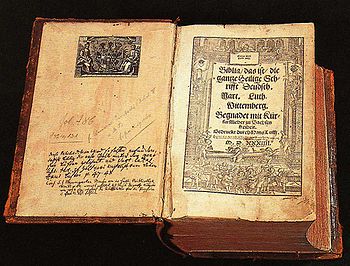After 500 Years, Reformation-Era Divisions Have Lost Much of Their Potency
Theological differences diminished to a degree that might have
shocked Christians in past centuries.
As
Protestants prepare to mark the 500th anniversary of the
Reformation,
new
Pew Research Center surveys show that in both
Western Europe and
the
United States, the theological differences that split Western
Christianity in the 1500s have diminished to a degree that might have
shocked Christians in past centuries.
When we look at the Lutheran, Calvinist,
Presbytarian, Pentecostal and Baptist churches we do not notice a lot of free thinking and continued Biblical study in the church.
While the Reformation led to more than a century of devastating wars
and persecution in
Europe, both Protestants and Catholics across the
continent now overwhelmingly express willingness to accept each other as neighbours and even as family members. this would not be bad when they all kept to study of the Bible and would aim to bring their flock closer to God.
The majority of present protestant churches are aiming to please their folks and are looking for ways to make their service as entertaining as possible; That way the
Pentecostals are enjoying a growth whilst many other protestant churches are loosing members.
In Western Europe, the Pew Research Center conducted telephone surveys from April 11
to Aug. 2, 2017, among 24,599 people across 15 countries. In the U.S.,
the survey was conducted online from May 30 to Aug. 9, 2017, among 5,198
panelists on Pew Research Center’s American Trends Panel (although all
of the questions analysed in the survey were
asked of only half the sample).
Of the U.S. Protestants 46% say the Bible provides all the religious guidance Christians need, a traditionally Protestant belief known as
sola scriptura.
But 52% say Christians should look for guidance from church teachings
and traditions as well as from the Bible, the position held by the
Catholic Church.
In the United States we can find mega churches where the preachers just shout with quotes from the bible but not really look into biblical texts to teach about the Word of God. How more entertaining a pastor can be how bigger his church can be.
Among self-identified white evangelicals, 44% express both convictions of sola fide and sola scriptura,
and this figure rises to 59% among white evangelicals who say they
attend church at least once a week. 19% say neither religious tradition espouses sola fide, and one-in-ten
U.S. adults (11%) say only
Catholicism traditionally teaches that
salvation comes through faith alone.
Among Protestants who know that only Protestantism (trinitarian) traditionally teaches
that salvation comes through faith alone, about three-quarters (77%)
embrace the concept of sola fide. But among the much larger share of
Protestants who are not aware that sola fide is solely a Protestant
teaching, far fewer (35%) believe that faith is all that is needed to
get into heaven. The survey does not take into account the non-trinitarian protestant churches which for the majority teach that people are not just saved by their baptism or by their reborn status. Most of non-trinitarian protestant churches teach one has to become like Christ and one has to follow the commandments of Christ and the commandments of God. According those churches one has to live according the faith and have to do good works. Without repenting for the wrong being done, they do not believe one can enter the Kingdom of God.

- In nearly all of the European countries surveyed, majorities or
pluralities of both Catholics and Protestants adhere to the
traditionally Catholic view that both faith and good works are necessary
to attain salvation. In fact, in every country except Norway (where 51%
of Protestants say salvation comes through faith alone), belief in sola
fide is a minority view even among Protestants.
- Catholics and Protestants in Western Europe generally report low
levels of religious observance: Medians of just 8% of Protestants and
14% of Catholics say they attend religious services weekly or more. But
Europeans who say religion is important in their lives are especially
likely to hold their respective church’s traditional position regarding
the means of salvation. For example, 31% of Protestants in Sweden who
say religion is “very” or “somewhat” important in their lives believe in
sola fide, compared with 10% of other Swedish Protestants.
- The impact of secularization is apparent, but so are pockets of
religiosity. For instance, the Netherlands has a relatively high level
of disaffiliation, with about half of Dutch adults (48%) describing
themselves as atheist, agnostic or “nothing in particular” religiously.
Yet Dutch Protestants also stand out for some of Europe’s highest
reported levels of church attendance, with 43% saying they go to church
at least once a week.
- In every European country surveyed, roughly nine-in-ten or more
Protestants and Catholics say they are willing to accept members of the
other tradition as neighbours. And large majorities of both groups say they would be willing to accept members of the other group into their families.
For example, 98% of German Protestants say they would accept Catholics
as members of their family, and a similar share of German Catholics
(97%) say the same about Protestants.
+
Find also to read
- Followers, protestors and reformers
- 500 years of a provision of the Word in the language of the peoples
- Religions and Mainliners
- Divisive pastors and Strange Fire conference
- The Catholic synod on the family and abortion
- The Anti-Reformation in Todays Evangelical Church
- A New Reformation
+++








